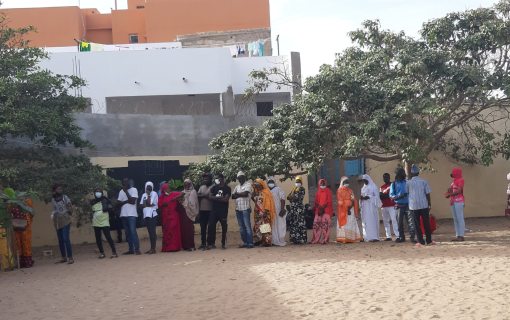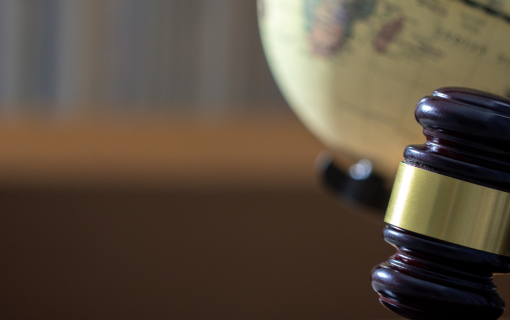President Wade Exits Gracefully
On the evening of Sunday, March 25, Senegalese President Abdoulaye Wade publicly congratulated his opponent Macky Sall for winning the second round of the presidential election and conceded defeat. Wade’s announcement was a welcome development in the electoral cycle that saw protests over the controversial decision by the constitutional court to allow the incumbent to run for a third term. Nicholas Matatu and Cheikh M. Gueye, IFES team leaders in Senegal specializing in civic education and electoral support, respectively, answer some questions about the Senegalese election.
After seeking a controversial third term, President Wade conceded defeat after the second round of the election. What is the mood like in Senegal at the moment?
Senegalese people are still digesting the reality of what happened on Election Day. There is a huge amount of pride due to the exemplary behavior citizens displayed on polling day, the smooth conduct of voting operations and the fact that the losing candidate conceded defeat so quickly. Many believe this election has re-established Senegal's pre-eminence as a democratic reference on the African continent, particularly after the coup in neighboring Mali just a few days earlier. There is a sense that this election is the beginning of a new era, with the president-elect being the country's first president born after independence in 1960.
How was the mood on Sunday, March 25, Election Day?
Peaceful. From the moment polls opened at 8 a.m., Senegalese citizens queued up patiently and calmly to exercise their vote. In the morning there were long lines everywhere, but voting proceeded quickly. Voters did not need to wait long to cast their ballot. There were a few isolated cases of scuffles, vote buying and intimidation, but, overall, voter conduct was exemplary. As polls closed, most people were at home and glued to their TVs or radios waiting for results. Even before President Wade called Macky Sall to congratulate him, people had already started to spill onto the streets in Dakar as the first results suggested a wide margin of victory. The news of Wade's concession sparked celebrations throughout the country that continued well into the early hours on Monday.
What was the turnout for the election and how does it compare to the first round?
Turnout was reported at 55 percent. Macky Sall obtained 65.8 percent (1,909,244 votes) with Wade picking up 34.2 percent (992,556 votes). In comparison, the turnout for the first round was 51.58 percent.
How did President-elect Macky Sall’s team mobilize supporters?
As with most elections when an incumbent is running, this was essentially a referendum on President Wade's rule. Yet, President-elect Macky Sall deserves a lot of credit for his campaign. Since creating his own political party over three years ago, he has traveled throughout the country listening to people's grievances and mobilizing support. His humble background and modest style endeared him to many voters. His campaign focused on reducing the cost of basic necessities, creating jobs and improving governance; the creation of an independent electoral commission is one of his priorities. All these issues struck a chord with ordinary Senegalese people.
Before the first round of elections, he was the only opposition candidate to conduct a proper campaign, with other candidates semi-boycotting in protest over President Wade's candidacy. After the first round, all 12 of the defeated candidates backed Macky Sall under the banner of the coalition "Benno Bokk Yakaar." This helped him win the election. The wide margin of defeat suggests President Wade had lost the confidence of the majority of the Senegalese population who wanted to see a change in the country's leadership.
When will Macky Sall assume office?
Probably around April 2. President Wade's mandate expires on April 3, so by law, the inauguration will need to take place before this. Macky Sall will definitely be in office to preside over Senegal's Independence Day celebration, which coincidentally falls on April 4.
What does this presidential election say about Senegal’s democracy?
There is no doubt this election is a big step forward for Senegal's democracy. President Wade's election in 2000 marked the first transition of power from an incumbent to an opposition leader in the country's history — and one of the first in Africa. Former President Abdou Diouf set a precedent when he congratulated Wade on his victory, and President Wade followed suit by congratulating Macky Sall before provisional results had even been announced.
Accepting results and conceding defeat is now firmly established as common practice in Senegalese electoral politics, something that is rare throughout the rest of the continent. The 2012 presidential election was probably the most contentious in the country's history, with unprecedented pre-electoral violence and a divisive debate over the legitimacy of the incumbent president's candidacy. Despite the tension, the country's election management body has been widely praised for organizing a credible and transparent election in an impartial manner.
Although this election is a sign of definite progress, Senegal still has a long way to go before it can be considered an established democracy. The last few years of President Wade's rule saw stagnation in democratic development, concentration of power in the executive and a lack of accountability, particularly in use of public funds. The upcoming legislative elections this June and the local elections in 2014 will be important opportunities for the country to build on the success of this presidential election.









